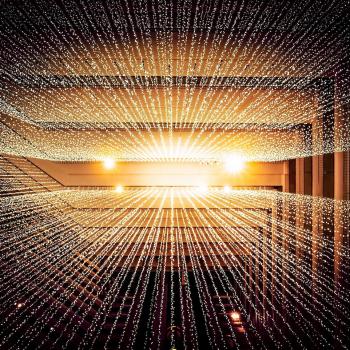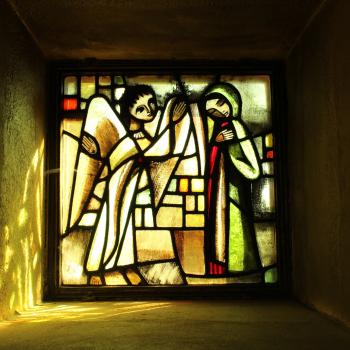
What does “God” mean to you? An almighty, omnipotent being sitting on a throne in the sky? Or something more ethereal, an otherworldly presence that defies definition?
I once wrote a story titled This May Be the Best Description of God Ever where God is defined as “the consciousness that moves between all living things.” (See the full passage below.) When I first read it, it was an “aha” moment. It struck me as the truth, or at least my truth. The same with a definition I had read years earlier, from the theologian Paul Tillich: “God is not a being, it is being itself.”
I recently stumbled upon another powerful description of God.
The blogger and dharma coach Erick Godsey admits to once being an atheist. In his younger years, he reveals that he once took pleasure in dismantling the belief systems of anyone who confessed they believed in God. But, as he grew older and wiser, his perspective began to change.
Godsey became heavily influenced by mythology and specifically the teachings of Jung. It would eventually lead him to the description of God that follows. As you read it, know that Godsey believes we are all “artists,” each of us with our own inherent artistic abilities that we need to bring forth. His description:
There is an intelligence in us, around us, as us, and beyond us that is trying to have a conversation with us. This intelligence needs not proof or a definition; it visits the artist regardless. The artist knows this intelligence. They live their lives in relationship with it. This intelligence leaves nightly love letters we call dreams. Through art and dreams, we know God.
Let me modify and shorten Godsey’s statement slightly, in case the term “artists” threw you off. A simplified version reads like this:
There is an intelligence in us, around us, as us, and beyond us that is trying to have a conversation with us. This intelligence needs not proof or a definition; it visits us regardless. You and I know this intelligence. We live our lives in relationship with it.
If you too believe such an “intelligence” exists, are you recognizing it or choosing to ignore it? If you become cognizant that this intelligence, aka God, is present in the next breath you take, in each person you encounter, IN EVERY MOLECULE OF LIFE, you might begin to see the world differently. It would become a wonderous, astounding, and magical place.
Godsey goes on to say that when we he first realized the presence of God, “I felt like it knew that I knew, that it was there. It felt like another locus of consciousness was realizing that I was finally realizing it. It felt like it was interested in what happened to me and what I thought.” He continues:
I know God is, and I know God is not understandable. It’s like looking at the ocean. As sure as I know it is there, I am awed by its immensity. I know it and know I can’t understand it.
The Original Best Description of God Ever.
It comes from Barbara Brown Taylor, a former ordained priest in the Episcopal Church, who went on to become a college professor and author. For Taylor, God is more of a presence than a person. In her wise words:
When I use the word God, I am so aware I’m using a code word and that everyone who hears that word and probably everyone who uses it imagines something different, imagines a different posture in front of that being, that presence. I suppose my own image, my own idea of God, as imperfect and as evolving as it is, right now would be the glue that hooks everything together, the consciousness that moves between all living things.
When I use the word God, I do not envision a large person with two arms, two legs and nose and two eyes. I envision, instead, some presence so beyond my being, a presence that both knows the stars by name and knows me by name, as well, that is not here to be useful to me, that is not here to give me things as much as to ask me to give myself away for love. I, of course, get a great deal of what I mean by God from the tradition in which I stand – the Christian tradition, the Hebrew Bible and New Testament. But when I say I believe in God, I mean I trust. I trust in the goodness of life, of being. I trust that beyond all reason. I trust that with my life. And that’s what I mean by God.
It later struck me that her description sounds a lot like “the Force” in Star Wars, which is defined in the movie as “an energy field created by all living things. It surrounds us and penetrates us; it binds the galaxy together.” It has always been here and will always be there. It exists whether we care to recognize it or not.
My Take
- Maybe the essence of God isn’t captured in a rigid definition or ancient text.
- Maybe the essence of God is found in the ever-present, flowing intelligence that connects us all. Call it God, the Universe, the Force, or “the consciousness that moves between all living things.”
- Maybe the important part is simply realizing this mysterious essence exists, within us and around us, patiently waiting to be recognized—and embraced.











